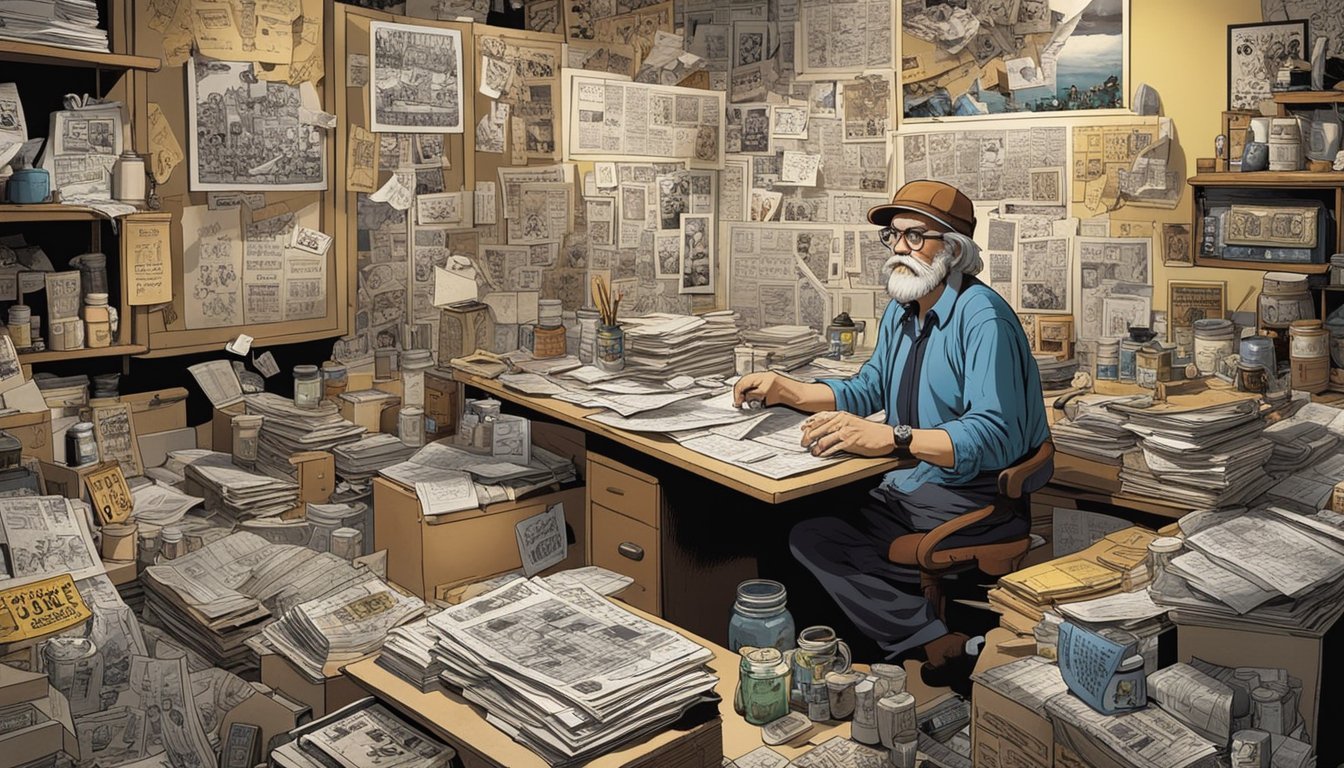Crumb (1994) Review
Unveiling the Intricacies of Real-Life Stories
The Crumb movie is a notable film that delves into the fascinating world of underground comics, specifically the life and works of renowned artist Robert Crumb. Directed by Terry Zwigoff, the documentary premiered in 1994 and quickly gained critical acclaim for its raw and honest portrayal of the controversial artist. Through a series of interviews and behind-the-scenes footage, the film offers a unique glimpse into Crumb's creative process, personal life, and his impact on the world of comics.
Beyond the story of Robert Crumb, the documentary also explores the broader context of underground comics and the counterculture movement of the 1960s and 1970s. By shedding light on Crumb’s unconventional perspectives and artistic expressions, it provides an in-depth understanding of the cultural and historical factors that shaped his work, making it an essential watch for anyone interested in the evolution and impact of comic art.
The film's unfiltered approach to its subject matter, combined with the undeniable talent and influence of Robert Crumb, has solidified "Documentary Crumb" as an important piece in the history of documentary filmmaking and underground art.
History of Crumb Documentaries
The documentary "Crumb" was released in 1994, directed by Terry Zwigoff. It is an intimate portrait of the underground cartoonist, Robert Crumb, and explores his life, art, and relationships with his family. Zwigoff first met Crumb in the 1970s when they both moved to San Francisco and became friends through their mutual appreciation for old blues music.
In the 1980s, Zwigoff took on the project of creating a documentary about Crumb. However, getting Crumb to agree to participate in the film was not easy. He was initially resistant, but after some persuasion, Crumb agreed to let Zwigoff document his life. The film took six years to complete, financed mostly through loans from friends, family, and colleagues. Along the way, Zwigoff faced several challenges, including negotiating Crumb's resistance to revealing certain aspects of his personal life.
The documentary serves as a rare insight into the mind and life of a creative genius. Throughout the film, we are introduced to Crumb's distinctive art style, which is often controversial due to its sexually explicit and provocative nature. In the film, Crumb describes how his art reflects his upbringing and the social environment surrounding him, as well as his fascination with the female form.
Crumb's family also plays a significant role in the documentary. It sheds light on his unusual upbringing and the influence of his family, especially his two brothers, on his art and life. Both his brothers, Charles and Maxon, were also talented artists but faced many personal struggles. Through candid interviews with family members, friends, and fellow artists, the complex dynamics of Crumb's personal life are revealed.
"Crumb" received widespread critical acclaim upon its release and won several awards at film festivals, including the Grand Jury Prize for Documentary at the Sundance Film Festival. The film also garnered an Oscar nomination for Best Documentary Feature. Over the years, it has become a cult classic and is regarded as one of the finest documentary films ever made.
This documentary has sparked conversations about the role of art in society and the importance of understanding the origins of one's creative process. Furthermore, it stands as a reminder of the power of the documentary medium in capturing the essence of complex and compelling personalities.
Pioneers in Crumb Documentary
The documentary, Crumb, directed by Terry Zwigoff, delves deeply into the life of its eccentric subject, Robert Crumb, one of the pioneers of underground comics. Launched in 1994, this documentary presents an intimate portrait of the artist, exploring his relationships, complex emotions, and the intricacies of his creative process.
One of Crumb's major contributions to the field of comics is the introduction of his iconic characters, such as Fritz the Cat, Mr. Natural, and Devil Girl. These characters, reflecting Crumb's distinctive style and uncanny ability to capture the zeitgeist of their time, left an indelible mark on the history of comics. Apart from their colorful personalities, these characters also served as a critique of social norms and conventions prevalent during the 1960s and 1970s.
Another key aspect of Crumb is the exploration of the artist's family dynamic, which profoundly influenced his work. Interviews with Crumb's two brothers, Charles and Maxon, unveil their hardships and the impact of these troubled relationships on their lives. Zwigoff's portrayal of the Crumb family offers crucial insights into the formative period of the artist's career and helps to contextualize the themes of his work.
The documentary also places substantial emphasis on the role of women in Crumb's art and personal life. His honest, albeit controversial, portrayal of women in his comics became a talking point, as some accused Crumb of promoting misogyny. Nevertheless, Crumb presents these contentious issues without prejudice, enabling viewers to reach their conclusions while considering the complexity of the artist's perspective.
In summary, the documentary Crumb delivers a comprehensive examination of the life and work of a groundbreaking figure in the world of comics. By exploring the personal and professional aspects of Robert Crumb's story, the film cements his place among the pioneers of this fascinating art form.
Evolution of Crumb Documentaries
The story of Crumb documentaries began with the release of Crumb in 1994. Directed by Terry Zwigoff, this documentary film chronicled the life and works of the acclaimed underground cartoonist, Robert Crumb. The film showcases his eccentric personality and unique artistic style, providing the viewers with a glimpse into the creative process behind his famous comic characters.
Over the years, the Crumb documentaries have evolved significantly, focusing on various aspects of the artist's life and career. For instance, some documentaries have zoomed in on Crumb's controversial artwork, examining his provocative themes and understanding the artist's intentions behind his creations.
Other Crumb documentaries have ventured into more personal territory, delving into the complicated dynamics of Crumb's family life. This includes exploring his relationships with his brothers, Maxon and Charles, who were both artists in their own right. The films depicted the siblings' struggles with mental illness and the challenges they faced while supporting one another in their artistic endeavors.
The documentaries have also made use of different formats to tell the story of Robert Crumb, incorporating interviews, home videos, and animated segments. These elements provide a richer understanding of the artist and his world.
In later documentaries, some filmmakers have taken a more analytical approach, dissecting Crumb's work to uncover deeper meanings and messages. These films tend to focus on specific comic book characters, allowing viewers to gain a greater understanding of the cartoonist's thought process and motivations.
Over the course of its evolution, Crumb documentaries have attracted a wide range of audiences. They draw in not only comic book fans but also those interested in understanding the broader themes of artistic expression and the human condition. While the primary subject of these films may have remained the same, the ways in which the stories are told have continually adapted and evolved, keeping viewers intrigued and engaged.
Key Themes in Crumb Documentaries
Depiction of Everyday Life
Crumb documentaries often feature a focus on the depiction of everyday life, showcasing the mundane and routine aspects of people's lives. This emphasis on ordinary events provides a sense of honesty and authenticity, allowing viewers to relate more to the subjects.
For example, in the documentary, Crumb explores the lives of underground comic artist Robert Crumb and his family. The film portrays their daily routines, habits, and interactions, providing a more profound understanding of their personalities and relationships.
Influence of Society and Culture
Another key theme in Crumb documentaries is the influence of society and culture on the subjects' lives. The documentaries examine how external factors such as societal norms, cultural beliefs, and historical events shape and affect individuals and their actions.
In Crumb, the director delves into the artist's experiences with societal rejection and his fascination with American popular culture. This exploration paints a picture of how the culture and society of the time influenced Crumb's art and personal life.
Traversal of Human Emotions
The final key theme in Crumb documentaries is the traversal of human emotions. The films attempt to explore a wide range of emotions experienced by their subjects, creating an emotional connection between the viewer and the people portrayed in the documentary.
The documentary Crumb delves into the psychological complexities of Robert Crumb and his family members, exploring emotions such as anxiety, depression, and even narcissism. By examining the spectrum of human emotions, the film allows viewers to empathize with the multifaceted personalities it presents.
Impact of Crumb Documentaries
The release of the documentary Crumb in 1994 significantly shaped public perception of underground cartoonist Robert Crumb. The film, directed by Terry Zwigoff, offered an intimate look into Crumb's life, family, and creative process. As a result, it provided audiences with a deeper understanding of his controversial art and its context.
The documentary generated a great deal of interest in Crumb's work, particularly in the art world. Following its release, his original artwork saw an increase in demand and value at auctions and galleries. This attention led to broader recognition and appreciation for Crumb's contributions to the comic book medium.
By addressing difficult topics such as mental health and family dysfunction, Crumb also sparked conversations about the role of artists and their personal lives in shaping their work. The film's portrayal of Crumb's personal struggles made it easier for audiences to see how his experiences influenced his art, demonstrating that even controversial art can come from a place of vulnerability and sincerity.
While Crumb gained significant critical acclaim, winning several awards ―including a Grand Jury Prize at the Sundance Film Festival―, it also faced its share of criticism. Some individuals felt that the documentary's focus on Crumb's dysfunctional family life overshadowed his creative achievements. Others took issue with the film's candid portrayal of sensitive topics, arguing that certain scenes were exploitative or unnecessary.
In the years since its release, the impact of Crumb has persisted. The documentary remains a significant part of Crumb's legacy and continues to evoke discussions and debates among critics, scholars, and fans alike. Its influence in the realm of documentary filmmaking and on the public image of underground artists cannot be underestimated.
Controversies and Criticism
Ethical Concerns
The documentary Crumb has faced its share of ethical concerns. Some viewers question the intrusion into the personal lives of Robert Crumb and his family. The film delves deeply into their past, exposing their dark secrets and troubled relationships, causing some to feel that the filmmakers crossed a boundary.
One specific concern relates to the depiction of Charles Crumb, Robert's brother. Charles is shown struggling with severe mental health issues, and the film has been criticized for potentially exploiting his vulnerability. Some argue that displaying these intimate moments may violate his privacy and dignity.
Representation and Biases
Another controversy surrounding Crumb is the issue of representation and biases. The documentary primarily focuses on Robert Crumb's life and experiences, which highlights his point of view. However, critics argue that this approach may result in an unbalanced portrayal of events.
For example, Robert Crumb's often sexist and racially charged illustrations have drawn criticism for their offensive content. The documentary explores his artwork but does not offer ample perspectives of those affected by these representations. This approach can be seen as giving validation to his controversial work without actively addressing the harmful effects they may have.
In summary, the documentary Crumb has faced controversies and criticism regarding its ethical concerns and representation issues. The filmmakers' decision to expose intensely personal aspects of the Crumb family's lives and the unbalanced portrayal of events have led to debates about the film's responsibly crafted narrative.
Recent Developments in Crumb Documentaries
In recent years, the interest in documentaries that highlight the life and works of acclaimed artists has grown. Among these documentaries is the film "Crumb," which is centered around the life of influential underground comic artist and social critic, Robert Crumb. The critically-acclaimed documentary was released in 1994 and directed by Terry Zwigoff. Since then, it has undergone a resurgence of interest.
Significant strides have been made in various aspects and mediums of storytelling and presentation. This increased accessibility to technology has allowed documentary filmmakers to reach wider audiences, particularly through online video platforms and streaming services. In this environment, "Crumb" has found a new generation of viewers who appreciate the innovative nature of Robert Crumb's work and its impact on the comics industry.
Aside from increased distribution channels, the artistry of Crumb's works has inspired other filmmakers and artists in the documentary field. This inspiration has led to follow-up features with related themes or works that pay homage to his unique style and social critiques. Those projects have brought a renewed focus on the underground comics movement and have encouraged the exploration of other significant artists from that era.
Another noteworthy development is the rise of academic studies related to Crumb's unique storytelling and character creation techniques. This emerging scrutiny has led to various analyses and texts, examining the intricate details of his work. As a result, a renewed appreciation for his storytelling talent has emerged among new and existing fans alike.
The increased awareness and changing landscape of creative expression have propelled documentaries like "Crumb" into the spotlight, allowing a plethora of opportunities for its continued influence in the filmmaking world and beyond. Although initially released close to three decades ago, the continuing interest in Crumb's life and artistry is a testament to the lasting impact of his work on the comics and the documentary genres.
Future Perspectives
The documentary Crumb offers an insightful look into the life of the renowned underground comic artist Robert Crumb. As viewers ponder the impact of his complex experiences on his art, it's reasonable to explore the future perspectives of his work and the genre as a whole.
As underground comics continue to gain traction in contemporary society, Robert Crumb's influence on the movement remains undeniable. Future artists may continue to be inspired by his unique drawing style and unapologetic portrayal of society's ills. With the rise of social media and digital platforms, there is ample opportunity for new creators to explore the realm of underground comics while paying homage to pioneers like Crumb.
Moreover, the exploration of mental health, personal trauma, and societal issues, as presented in Crumb, can encourage a deeper understanding of such topics. As society becomes more open to discussing these themes, the realm of underground comics has the potential to tackle these subjects in an unfiltered and genuine manner, much like Crumb's work has done in the past.
In conclusion, the documentary Crumb not only sheds light on the life of a revolutionary artist but also sparks a discussion on the future perspectives of underground comics. As new generations of creators emerge, Robert Crumb's influence and the exploration of critical themes in his work will likely continue to shape this genre in the years to come.
#robert hughes #frank and surreal chronicle #robert crumb initially #robert crumb's brothers #director terry zwigoff #ten greatest films #dana crumb #crumb reveals #apple tv #crumb cooperate
More from Factual America:
Best Documentaries About Ancient Civilizations: Top Picks for History Enthusiasts
Best Documentaries About Popular Writers: Must-Watch Insights and Stories
Best Documentaries about Psychology: Top Picks for Insightful Minds
Best Documentaries About Quantum Physics: Unraveling the Secrets of the Universe
Documentary Happy (2011): Exploring the Science of Happiness
Best Documentaries about Writers: Uncovering Literary Masters
Best Documentaries About Yoga: Uncovering the Power of Practice
Best Documentaries about Mental Health Struggles: Top Picks for Insight and Empowerment








